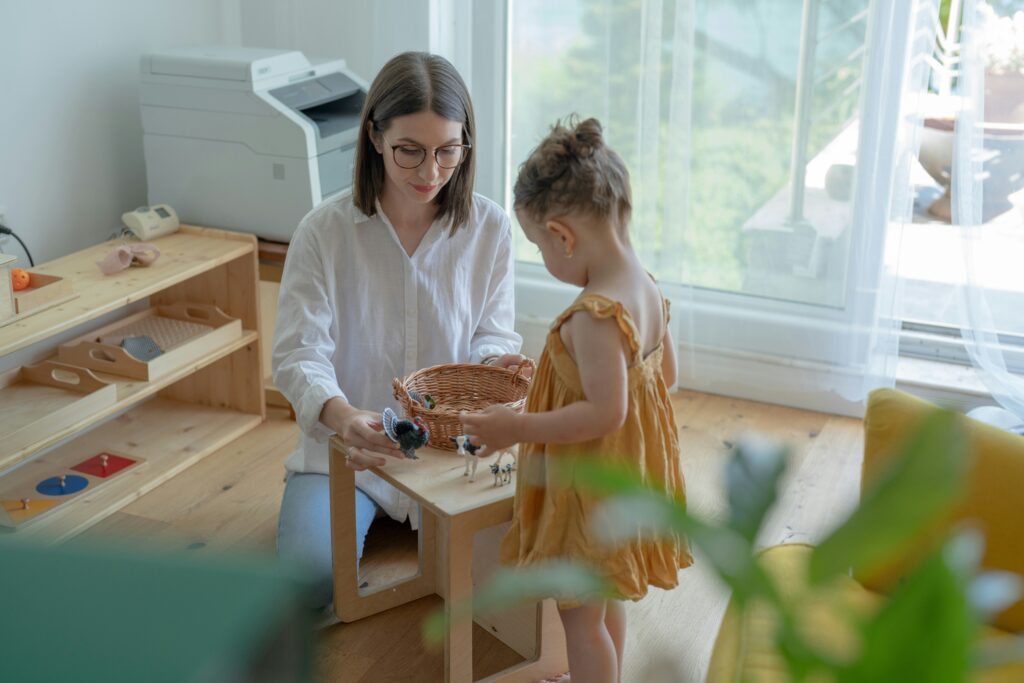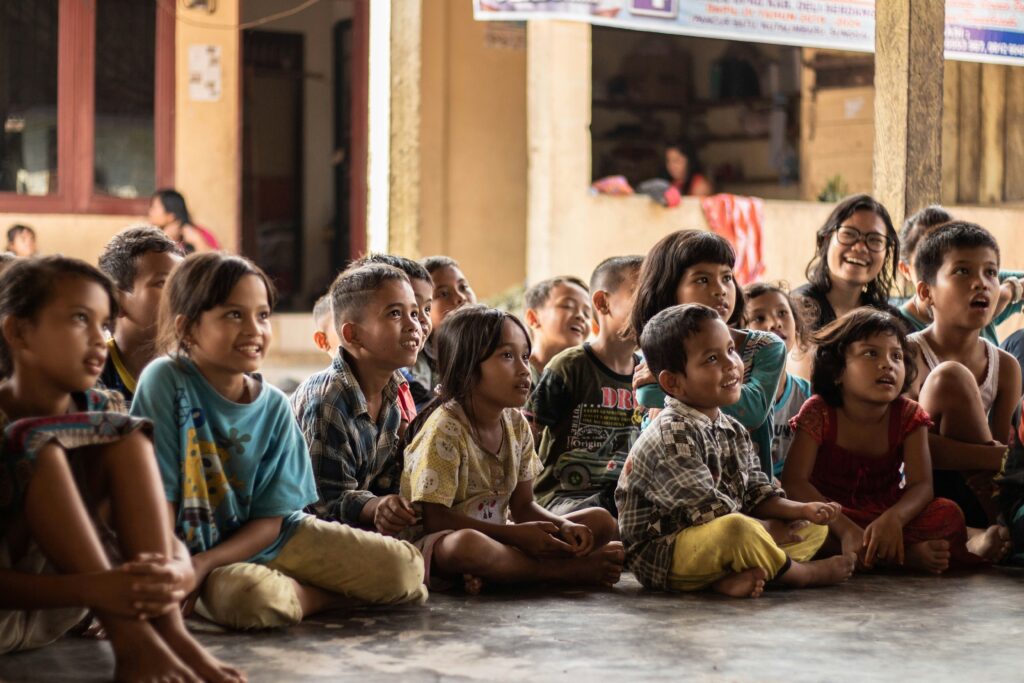
Early childhood education starts roughly from birth to age five, is a period of incredible growth and development. During this time, the brain forms at a rapid pace, making it a crucial window for learning and establishing foundational skills. Early childhood education (ECE) programs play a vital role in nurturing this development, providing a structured and stimulating environment that goes beyond simple babysitting.
These programs offer a variety of experiences that cater to a child’s cognitive, social, emotional, and physical needs. Through play-based learning, exploration, and interaction with peers and educators, children in ECE programs develop a strong foundation for success in school and beyond. Studies have shown that high-quality ECE programs can lead to numerous benefits, including:
- Enhanced cognitive skills: ECE programs can improve language development, early literacy skills, critical thinking, and problem-solving abilities.
- Stronger social and emotional development: Children learn valuable social skills like communication, cooperation, and conflict resolution. They also develop emotional intelligence, self-regulation, and a sense of self-confidence.
- Improved school readiness: ECE programs can help children develop the skills needed to transition smoothly to kindergarten, including following routines, listening to instructions, and participating in group activities.
- Long-term benefits: The positive effects of ECE can extend far beyond the early years. Research suggests that children who participate in high-quality programs are more likely to graduate high school, pursue higher education, and secure stable employment as adults.
In essence, early childhood education is an investment in a child’s future. By providing a nurturing and stimulating environment during this critical period, ECE programs help build a strong foundation for lifelong learning, success, and well-being.
The Building Blocks of Success: How Early Childhood Education Benefits Your Child

Early childhood education (ECE) programs offer a treasure trove of benefits that extend far beyond simply keeping children occupied. These programs are designed to nurture a child’s development across various domains, laying the foundation for future success in school and life. Here’s a closer look at how ECE programs specifically impact a child’s:
1. Cognitive Development:
- Language Skills: Through exposure to rich vocabulary, storytelling, and interactive activities, children in ECE programs develop strong language skills. They learn to express themselves clearly, understand complex instructions, and engage in meaningful conversations.
- Problem-Solving and Critical Thinking: Play-based learning in ECE programs encourages children to explore, experiment, and overcome challenges. This fosters critical thinking skills as they learn to analyze situations, make decisions, and find solutions to problems.
- Early Literacy Skills: ECE programs introduce children to the world of literacy through exposure to books, songs, and activities that build phonemic awareness, letter recognition, and early reading skills. This sets the stage for a smooth transition to formal reading instruction in kindergarten.
2. Social and Emotional Development:
- Communication and Cooperation: ECE programs provide opportunities for children to interact and build relationships with peers and educators. They learn valuable communication skills, such as active listening, taking turns, and expressing their needs and feelings effectively. Through collaborative play and group activities, children also develop cooperation skills, learning to work together towards a common goal.
- Conflict Resolution: ECE programs create a safe space for children to experience and navigate social conflicts. With guidance from educators, they learn strategies for resolving disagreements peacefully, compromising, and building empathy for others.
- Self-Regulation and Emotional Intelligence: ECE programs help children develop emotional intelligence by teaching them to identify and manage their emotions. Through routines and consistent expectations, children learn self-regulation skills, such as managing frustration, calming down, and expressing themselves appropriately.
3. Physical Development:
- Motor Skills: ECE programs often incorporate activities that promote the development of gross motor skills (large muscle movements) and fine motor skills (small muscle movements). Through play with toys, climbing equipment, and arts and crafts materials, children develop coordination, balance, strength, and dexterity.
- Healthy Habits: Many ECE programs integrate lessons on healthy eating, hygiene practices, and physical activity. These early introductions help children develop a foundation for lifelong healthy habits.
By addressing these crucial developmental areas, ECE programs empower children to become confident, well-rounded individuals who are eager to learn and thrive in future endeavors.
Sparking Curiosity: Age-Appropriate Activities for Engaged Learning
ECE thrives on the power of play! By providing children with engaging activities that cater to their specific age and developmental needs, we can ignite their curiosity, fuel their learning, and set the stage for a lifelong love of exploration. Here’s a breakdown of some age-appropriate activities that can be incorporated into an ECE program or even enjoyed at home:
For Toddlers (1-3 years old):
- Sensory Play: Sensory play is a cornerstone of learning for toddlers. Activities that engage their senses of touch, sight, smell, taste (in a safe way!), and hearing provide a rich and stimulating environment. This can include playing with playdough, finger paints, water beads, sand, or sensory bins filled with different textures.
- Singing Songs and Rhymes: Singing songs and reciting rhymes exposes toddlers to new sounds and words, fostering language development and early literacy skills. The repetitive nature of songs also helps them learn rhythm and build memory.
- Storytelling: Storytelling is a magical experience for toddlers. It captures their imagination, expands their vocabulary, and introduces them to new concepts. Interactive storytelling, where toddlers can participate in the story through actions or sound effects, further enhances their engagement.
- Pretend Play: Pretend play allows toddlers to explore different roles and scenarios, fostering their creativity, social skills, and problem-solving abilities. Providing simple props like dress-up clothes, toy cars, or stuffed animals can spark hours of imaginative play.
For Preschoolers (4-5 years old):
- Arts and Crafts: Arts and crafts activities allow preschoolers to express themselves creatively, develop fine motor skills, and build hand-eye coordination. From painting and drawing to cutting and pasting, the possibilities are endless!
- Building with Blocks: Building with blocks is a classic activity that encourages preschoolers to explore spatial relationships, develop problem-solving skills, and practice critical thinking as they construct towers, bridges, and other imaginative creations.
- Exploring Nature: Spending time outdoors provides a wealth of learning opportunities for preschoolers. Exploring nature allows them to observe plants and animals, learn about different ecosystems, and develop a sense of wonder for the world around them. Simple nature walks, scavenger hunts, or planting seeds can spark a love for the environment.
- Simple Science Experiments: Preschoolers are naturally curious about the world. Introducing them to basic science concepts through simple experiments can ignite their curiosity and encourage critical thinking. Activities like mixing baking soda and vinegar to observe a chemical reaction, building a mini-volcano, or exploring the properties of light and shadow can be both fun and educational.
Remember, the key to fostering engaged learning is to create a fun and stimulating environment where children feel comfortable exploring, asking questions, and making mistakes. By incorporating these age-appropriate activities, we can nurture a love of learning that will stay with them for years to come.
Cultivating Curiosity: Building a Learning Environment at Home
ECE doesn’t have to be confined to the walls of a classroom. You can create a nurturing and stimulating learning environment right within your own home! By providing a few key elements, you can encourage your child’s exploration, foster a love of learning, and support their development in a fun and interactive way. Here are some tips to get you started:
Provide Open-Ended Toys and Materials:
- Open-ended toys and materials are those that can be used in multiple ways, sparking creativity and imagination. This is in contrast to toys with a single prescribed function. Think building blocks, Legos, dolls, stuffed animals, play dough, art supplies, and dress-up clothes.
- Open-ended materials also encompass household items like cardboard boxes, blankets, pots and pans, and measuring cups. These everyday objects can be transformed into forts, spaceships, or a make-believe kitchen, fostering imaginative play.
Encourage Exploration and Discovery:
- Create a designated space, even a small corner, for your child’s learning activities. This space should be well-lit, safe, and stocked with their favorite open-ended toys and materials.
- Let your child take the lead! Instead of directing their play, observe their interests and provide opportunities for them to explore and discover on their own. Ask open-ended questions like “What can you build with these blocks?” or “What sound does the spoon make in the pot?” to encourage curiosity and critical thinking.
Make Learning Fun and Engaging:
- Incorporate learning into everyday routines: Singing songs while cleaning up, counting toys while putting them away, or reading stories before bed are all simple ways to integrate learning into daily activities.
- Turn everyday tasks into learning adventures: Transform grocery shopping into a treasure hunt for specific shapes or colors. Cooking together can teach basic math concepts like measuring ingredients. Even taking a walk outdoors can be an opportunity to learn about nature and identify different plants and animals.
- Embrace the power of play: Remember, play is a child’s natural way of learning. Let them explore, experiment, and have fun. Your enthusiasm and positive interactions will further enhance their learning experience.
By following these tips and creating a stimulating home learning environment, you can become your child’s first and most important teacher, nurturing their curiosity and setting them on the path to lifelong learning and success.
The Lasting Impact: Early Childhood Education – An Investment in Your Child’s Future
The early years of a child’s life are a whirlwind of growth and development. During this critical period, the brain is forming at an incredible pace, laying the foundation for everything that comes next. Early childhood education (ECE) programs play a vital role in nurturing this development, providing a structured and stimulating environment that goes far beyond simple babysitting.
These programs offer a treasure trove of benefits that extend across cognitive, social, emotional, and physical domains. Through play-based learning, exploration, and interaction with peers and educators, children in ECE programs develop a strong foundation for success in school and beyond. They acquire essential language skills, critical thinking abilities, and a love for learning. They learn to navigate social interactions, build healthy relationships, and manage their emotions effectively. They develop strong motor skills, explore healthy habits, and discover a sense of wonder for the world around them.
In essence, early childhood education is an investment in a child’s future. By providing a nurturing and stimulating environment during this critical period, ECE programs help build a foundation for lifelong learning, success, and well-being. The benefits of these programs extend far beyond the early years, with research suggesting that children who participate in high-quality ECE are more likely to graduate high school, pursue higher education, and secure stable employment as adults.
But how do you ensure your child receives the full benefits of early childhood education?
Here are some resources and strategies to consider:
- Explore Early Childhood Education Options: Research childcare centers, preschools, or playgroups in your community. Consider factors like program philosophy, curriculum, class size, and teacher qualifications. Schedule visits and ask questions to find a program that aligns with your child’s needs and your family’s values.
- Embrace Learning at Home: Remember, early childhood education doesn’t stop at the classroom door. You can create a rich learning environment right within your own home. Provide open-ended toys and materials that spark creativity and exploration. Encourage curiosity and discovery by asking open-ended questions and letting your child take the lead in their play. Transform everyday tasks into learning adventures by incorporating counting, singing, or reading into routines. Most importantly, make learning fun and engaging! Let your child explore, experiment, and have fun. Your enthusiasm and positive interactions will further enhance their learning experience.
- Tap into the Power of Books and Storytelling: Reading books together exposes children to new vocabulary, expands their imagination, and fosters a love of language. Make storytelling a regular part of your child’s day. Encourage them to participate by asking questions, making sound effects, or acting out parts of the story.
- Explore the Wonders of Nature: Spending time outdoors provides a wealth of learning opportunities. Take walks in nature parks, observe plants and animals, or plant a small garden together. Simple nature walks can be an opportunity to learn about different ecosystems, explore the properties of leaves and rocks, and develop a sense of wonder for the world around them.
- Embrace the Power of Play: Play is a child’s natural way of learning. From building elaborate castles with blocks to pretending to be a doctor or a superhero, play allows children to explore their creativity, develop social skills, and practice problem-solving abilities. Let your child take the lead in their play and resist the urge to over-structure their activities.
- Seek Additional Resources: Numerous online resources and educational websites offer age-appropriate activities, learning games, and printable worksheets that can supplement your child’s learning at home. Public libraries are also a treasure trove of children’s books, educational toys, and storytime programs.
The early years are a fleeting yet crucial window of opportunity. By providing a nurturing and stimulating environment, both at home and through early childhood education programs, we can empower our children to become confident, well-rounded individuals who are eager to learn and thrive. Remember, you are your child’s first and most important teacher. Embrace the journey of discovery, ignite their curiosity, and watch them blossom into lifelong learners, ready to take on the world.

I don’t think the title of your article matches the content lol. Just kidding, mainly because I had some doubts after reading the article.
Thanks for sharing. I read many of your blog posts, cool, your blog is very good.